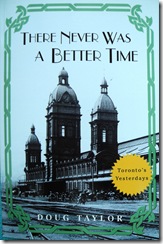The information below is from the book, “There Never Was A Better Time.” The novel is a tale of two mischievous young men, who in 1921 immigrated to Canada from the small fishing village of Burin Bay in Newfoundland, in the days prior to confederation. Their parents, John and Mary Taylor, grandfather Job, and younger brothers remained in the homestead beside the rocky shoreline of Burin Bay. This story tells of the first Christmas that the family in Newfoundland did not celebrate the holidays together. It includes a description of family members going out “mummering.” This information precedes the story of mummering to allow the reader to appreciate the history of the ancient tradition.
The Tradition of “Mumming” (Mummering) in Old Newfoundland
“Mumming” was a much-anticipated tradition in Burin, Newfoundland. It commenced after sunset on Christmas Eve. Most people, however, remained at home with their families on Christmas night and began mumming on 26 December. Before it ended on Old Christmas Day—6 January—everyone had experienced a few surprises.
Mumming dated back to medieval times, and had been very popular in the royal court of King Edward III (1327–77). When Sir Humphrey Gilbert visited Newfoundland in 1583, most members of his crew were from the Wessex Counties, and they entertained the other fishermen, who were mostly French or Spanish, by dressing up and performed skits.
England banned the custom during the years of the Lord Protector, Oliver Cromwell (1653–58). It continued in the New World, as it had been well established by the fishermen. In the 1840s, it reached the height of its popularity in Newfoundland, with those who participated calling themselves “mummers.” In England and in the north of Newfoundland, people referred to the tradition as “dressing up” or “masking.” On the south and east coasts of Newfoundland, it was called “mummering” or “janneying.”
The term “mummer” was derived from the fact that those who were mumming remained silent (mum) to prevent those for whom they performed from guessing their identities. The origin of the word “janneying” is uncertain, but some believe it was derived from “jannies,” referring to young boys who disguised themselves to perform mischief during the Christmas season.
In Newfoundland, mummers felt that they possessed an automatic right to enter any home, although people considered it courteous for them to request permission. Folks took advantage and rarely refused them entrance, as they considered it good luck to welcome uninvited visitors during the festive season. To engage in mummering, people donned disguises, wearing old clothes and makeshift costumes in a creative manner.
During the twelve days of Christmas, they travelled after sunset in small groups to visit their neighbours. The women often dressed as men, and vice versa. The idea was to entertain by dancing, playing instruments, or performing a simple drama (which was sometimes rude and irreverent). Their audience tried to guess the names of their visitors. If they identified someone, that person had to unmask. At the conclusion of the lively performance, everyone unmasked, and the hosts provided treats of cake, cookies, and hot drinks. The mummers then proceeded to another house and repeated the ritual once more.
A link to the book, “There Never Was a Better Time,” https://tayloronhistory.com/there-never-was-a-better-time/
The author’s Home Page ; https://tayloronhistory.com/
